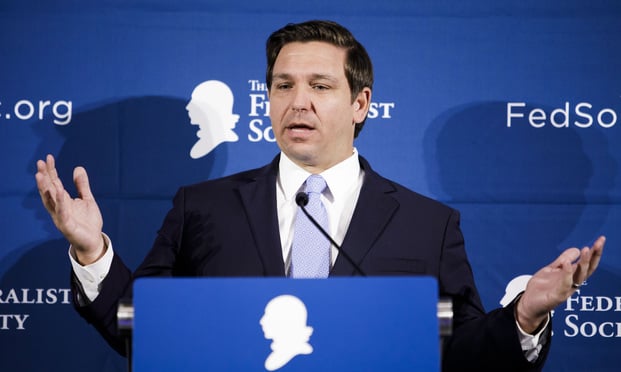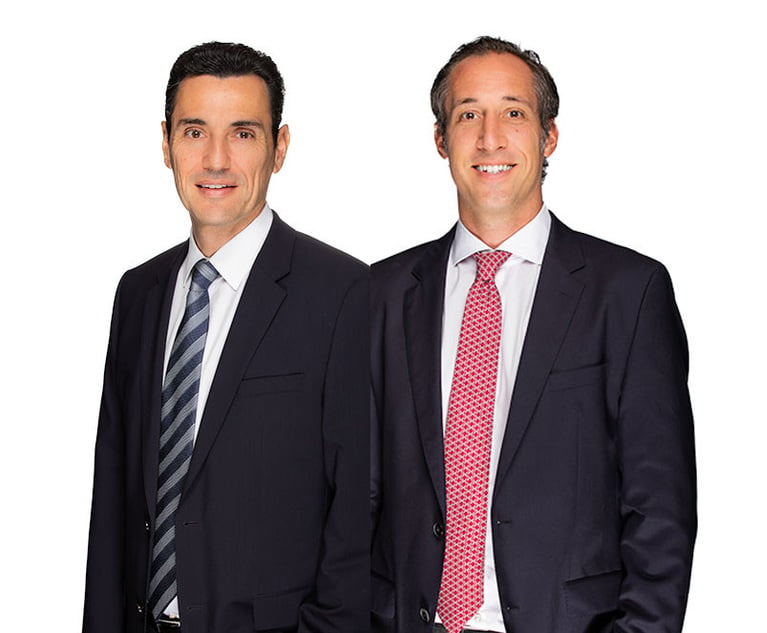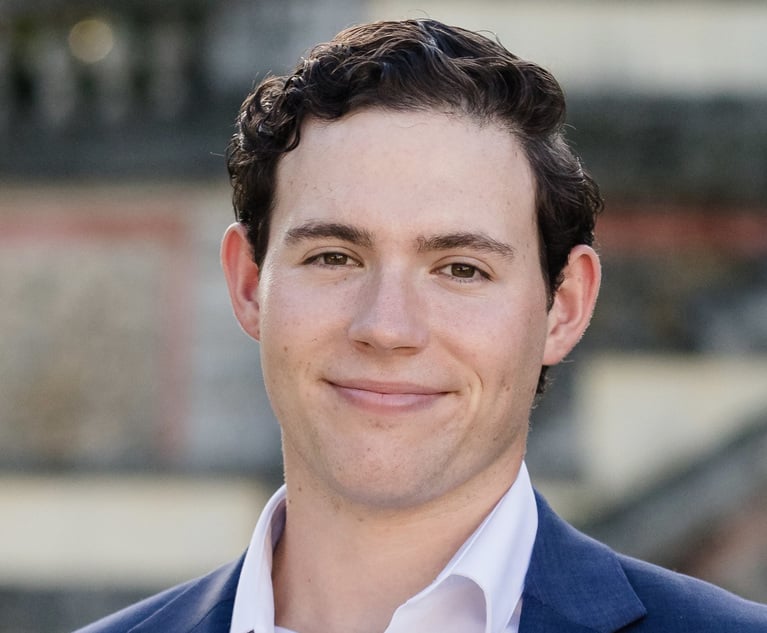Despite Reopenings, Florida Firms Aren't Rushing Back to the Office
Florida law firm leaders say productivity hasn't suffered with people at home.
May 06, 2020 at 06:27 PM
6 minute read
 Florida Gov. Ron DeSantis (Photo: Diego M. Radzinschi/ALM)
Florida Gov. Ron DeSantis (Photo: Diego M. Radzinschi/ALM)
Kelley Kronenberg CEO Michael Fichtel is in no hurry to bring his nearly 400 employees back to their desks.
Productivity has stayed strong, even though the vast majority of the firm's workforce has been working remotely since March. Billing and collections have been steady, although there has been a drop in work for the real estate department. The firm has not had to institute austerity measures, Fichtel said.
So despite moves by Gov. Ron DeSantis to slowly reopen Florida's economy after more than a month of closure aimed at stemming the spread of the novel coronavirus, Fichtel has set no timetable on a return.
"As far as opening the offices, returning to work, that is something that we are not pushing at all," he said. "We will reopen when the time is right, and that could be 30 days from now at the earliest and possibly several months at the latest."
DeSantis, like many governors across the country, has rolled out plans to gradually reopen businesses as pandemic-induced closures ravage companies large and small. Texas and Georgia were among the first states to relax their social distancing requirements, allowing movie theaters, restaurants and retailers to reopen at reduced capacity. But in recent days, states such as New York and Illinois have announced their own reopening plans.
This week, DeSantis announced phase one of Florida's reopening, beginning with restaurants, shops, libraries and museums outside of South Florida, the hardest-hit region in the state, albeit with strict restrictions on capacity. Beaches and state parks have, for the most part, reopened as well.
The relaxing comes as Florida announced that Wednesday saw the third-highest single-day death toll as 68 people perished from the coronavirus. As of Wednesday, the statewide infection count reached 38,002 confirmed cases.
DeSantis, in his April 1 stay-at-home order, largely carved out law firms and other legal services as essential, although most firms had already sent their employees home to work remotely.
And the state's legal community has not changed its approach to social distancing. On Tuesday, Florida Chief Justice Charles Canady issued an emergency order barring state court trials until July 2, the last day weekday before the July 4 holiday. The order parallels actions by South Florida's federal courts, which allow in-person hearings only in emergency cases and after consultation with U.S. District Chief Judge K. Michael Moore.
Similarly, in Georgia and Texas, where government officials have been easing restrictions, some law firm leaders are not eager to return to their brick-and-mortar locations.
Fichtel said he is looking to scientific consensus, not the state, as the most influential factor in reopening the firm's nine Florida offices.
Weiss Serota Helfman Cole & Bierman managing director Mitchell Burnstein is in no rush to bring his employees back into the office either.
"We are making our own decision, completely independent of what the federal government or what the state does," Burnstein said. "The most important criteria is that scientific data is showing that the virus is on the decline."
Like Kelley Kronenberg, productivity at Weiss Serota has stayed strong, despite the fact that the vast majority of the firm's workforce has been working remotely since mid-March. The firm has gotten steady work representing local governments and businesses as they navigate the strange landscape colored by a global pandemic and free-falling revenues.
"Fortunately, our employees have been very productive working remotely so we're not in a hurry to reopen our offices," Burnstein said. "And we won't force our employees into the offices."
Bilzin Sumberg Baena Price & Axelrod managing partner Al Dotson Jr. said that, even if DeSantis lifted restrictions for legal services, returning back to the office will take a coordinated effort within the private sector. Since Bilzin Sumberg, like many other firms, is not the only occupant in its building, the building's tenants and landlord must be in agreement about how to operate going forward if they want to reopen safely.
"It's important for there to be a coordinated effort from the tenants and the landlord," Dotson said. "Elevators, for example, are a practical component that needs to be worked out."
Fichtel and Kelley Kronenberg have developed a 10-page procedural report outlining the steps the firm may take to ensure safety in the event that its employees return to the office. Those procedures include requiring masks, spacing out the office, rotating days its employees come in, limiting conference room meetings to no more than five attendees and even taking the temperature of anybody who walks into the office, employees and clients alike.
"Safety is No. 1 because we have no clamoring to get back to the office," Fichtel said.
And while, in time, the attorneys and staff will return to their offices, Florida Bar President John Stewart said the advantages of using technology and working remotely won't be forgotten even in a post-pandemic world.
"I'm optimistic that we can't un-ring that bell," said Stewart, who came into the presidency with a priority of expanding the use of technology in the law.
Stewart sees the widespread adoption of videoconferencing and remote setups as more efficient and cost-effective in many scenarios, a sentiment echoed by many Florida litigators. For instance, he said, it's not uncommon for an attorney to drive 45 minutes to a courthouse and wait half an hour to be heard—all to appear for a 15-minute matter. Going forward, those short hearings could be addressed over videoconferencing.
"It's cost-saving to clients, and time-saving for lawyers," he said.
Burnstein agreed, adding that the success of Weiss Serota's remote shift, and the little-to-no drop in productivity, has him and his firm rethinking their overhead.
"This event certainly has crystallized our thoughts on how much workspace we need and how we are going to utilize that workspace. There is no doubt about that," Burnstein said. "Now that we've seen how productive our attorneys can be wherever they are, it has definitely grabbed our attention."
Read More
Florida State Courts Extend Coronavirus Outage Into July
This content has been archived. It is available through our partners, LexisNexis® and Bloomberg Law.
To view this content, please continue to their sites.
Not a Lexis Subscriber?
Subscribe Now
Not a Bloomberg Law Subscriber?
Subscribe Now
NOT FOR REPRINT
© 2025 ALM Global, LLC, All Rights Reserved. Request academic re-use from www.copyright.com. All other uses, submit a request to [email protected]. For more information visit Asset & Logo Licensing.
You Might Like
View All
Saul Ewing Loses Two Partners to Fox Rothschild, Marking Four Fla. Partner Exits in Last 13 Months
3 minute read
Calif. Fires Should Serve as a Reminder to Fla.’s Commercial Landlords and Tenants Not to Be Complacent
6 minute read
The Hidden Risks and Benefits of Investing in a Condo-Hotel or Branded Condominium Unit
9 minute readLaw Firms Mentioned
Trending Stories
- 1Eliminating Judicial Exceptions: The Promise of the Patent Eligibility Restoration Act
- 2AI in Legal: Disruptive Potential and Practical Realities
- 3One Court’s Opinion on Successfully Bankruptcy Proofing a Borrower
- 4Making the Case for Workflow Automation
- 5Copyright Infringement by Generative AI Tools Under US and UK Law: Common Threads and Contrasting Approaches
Who Got The Work
J. Brugh Lower of Gibbons has entered an appearance for industrial equipment supplier Devco Corporation in a pending trademark infringement lawsuit. The suit, accusing the defendant of selling knock-off Graco products, was filed Dec. 18 in New Jersey District Court by Rivkin Radler on behalf of Graco Inc. and Graco Minnesota. The case, assigned to U.S. District Judge Zahid N. Quraishi, is 3:24-cv-11294, Graco Inc. et al v. Devco Corporation.
Who Got The Work
Rebecca Maller-Stein and Kent A. Yalowitz of Arnold & Porter Kaye Scholer have entered their appearances for Hanaco Venture Capital and its executives, Lior Prosor and David Frankel, in a pending securities lawsuit. The action, filed on Dec. 24 in New York Southern District Court by Zell, Aron & Co. on behalf of Goldeneye Advisors, accuses the defendants of negligently and fraudulently managing the plaintiff's $1 million investment. The case, assigned to U.S. District Judge Vernon S. Broderick, is 1:24-cv-09918, Goldeneye Advisors, LLC v. Hanaco Venture Capital, Ltd. et al.
Who Got The Work
Attorneys from A&O Shearman has stepped in as defense counsel for Toronto-Dominion Bank and other defendants in a pending securities class action. The suit, filed Dec. 11 in New York Southern District Court by Bleichmar Fonti & Auld, accuses the defendants of concealing the bank's 'pervasive' deficiencies in regards to its compliance with the Bank Secrecy Act and the quality of its anti-money laundering controls. The case, assigned to U.S. District Judge Arun Subramanian, is 1:24-cv-09445, Gonzalez v. The Toronto-Dominion Bank et al.
Who Got The Work
Crown Castle International, a Pennsylvania company providing shared communications infrastructure, has turned to Luke D. Wolf of Gordon Rees Scully Mansukhani to fend off a pending breach-of-contract lawsuit. The court action, filed Nov. 25 in Michigan Eastern District Court by Hooper Hathaway PC on behalf of The Town Residences LLC, accuses Crown Castle of failing to transfer approximately $30,000 in utility payments from T-Mobile in breach of a roof-top lease and assignment agreement. The case, assigned to U.S. District Judge Susan K. Declercq, is 2:24-cv-13131, The Town Residences LLC v. T-Mobile US, Inc. et al.
Who Got The Work
Wilfred P. Coronato and Daniel M. Schwartz of McCarter & English have stepped in as defense counsel to Electrolux Home Products Inc. in a pending product liability lawsuit. The court action, filed Nov. 26 in New York Eastern District Court by Poulos Lopiccolo PC and Nagel Rice LLP on behalf of David Stern, alleges that the defendant's refrigerators’ drawers and shelving repeatedly break and fall apart within months after purchase. The case, assigned to U.S. District Judge Joan M. Azrack, is 2:24-cv-08204, Stern v. Electrolux Home Products, Inc.
Featured Firms
Law Offices of Gary Martin Hays & Associates, P.C.
(470) 294-1674
Law Offices of Mark E. Salomone
(857) 444-6468
Smith & Hassler
(713) 739-1250







